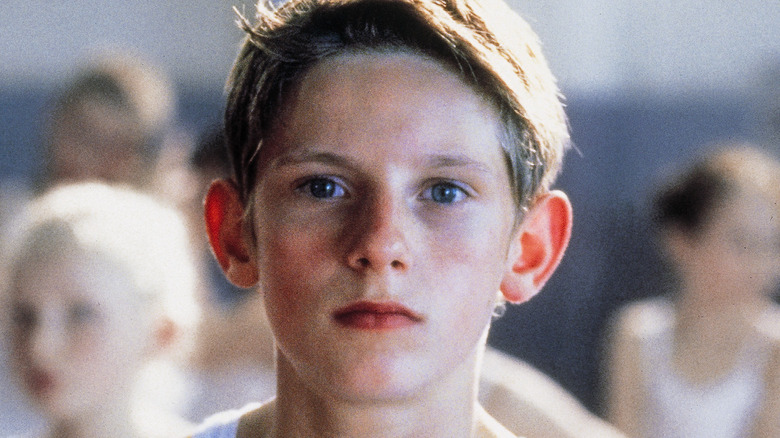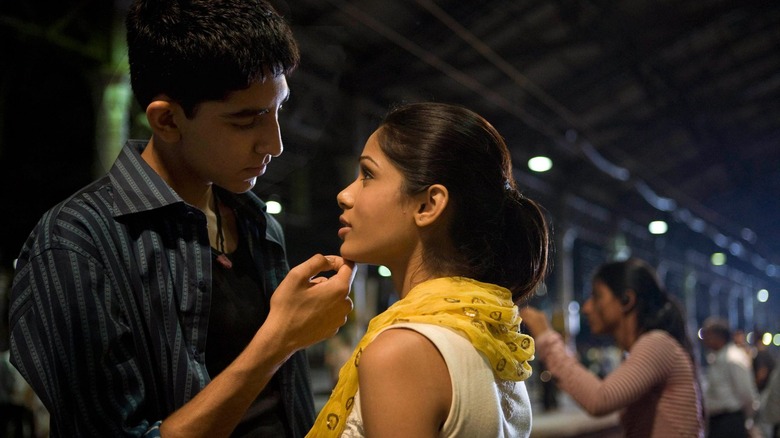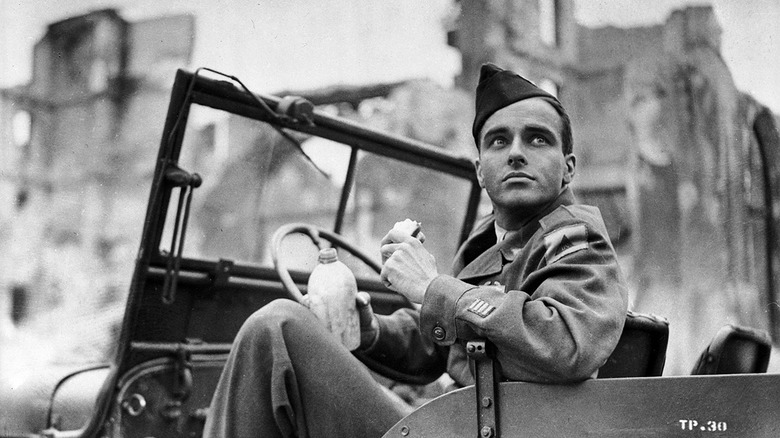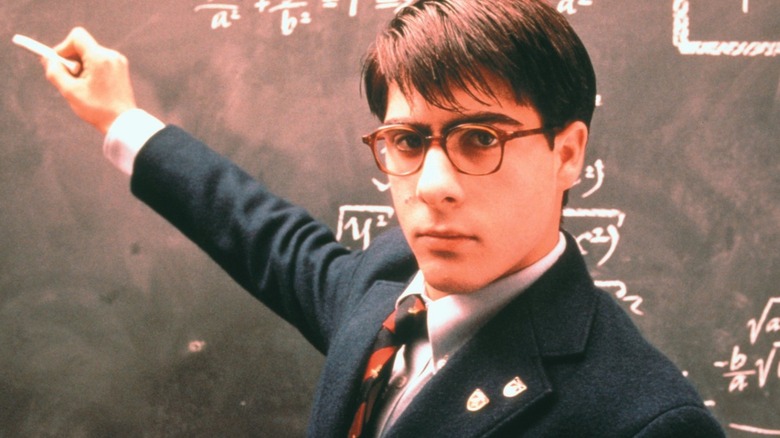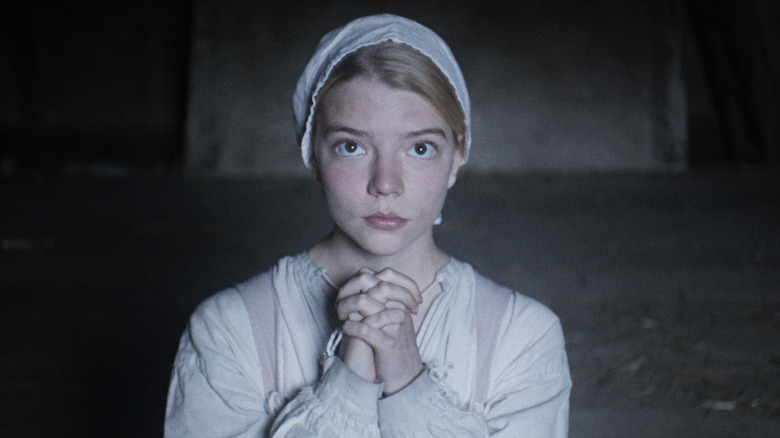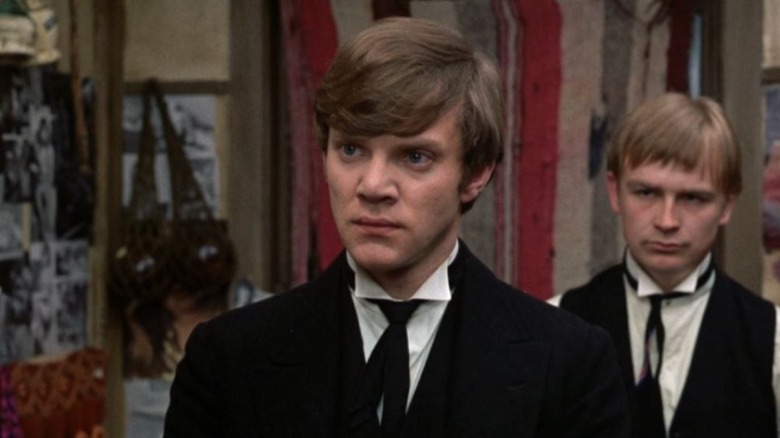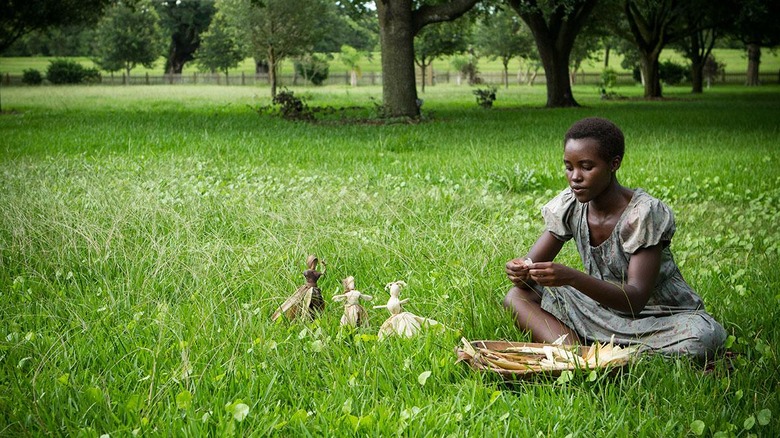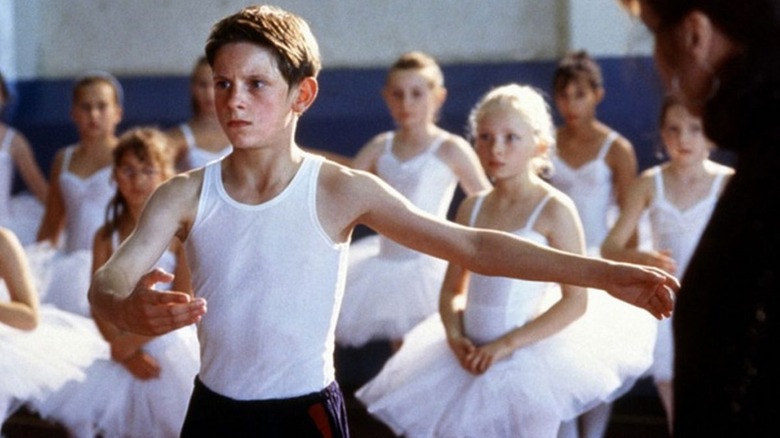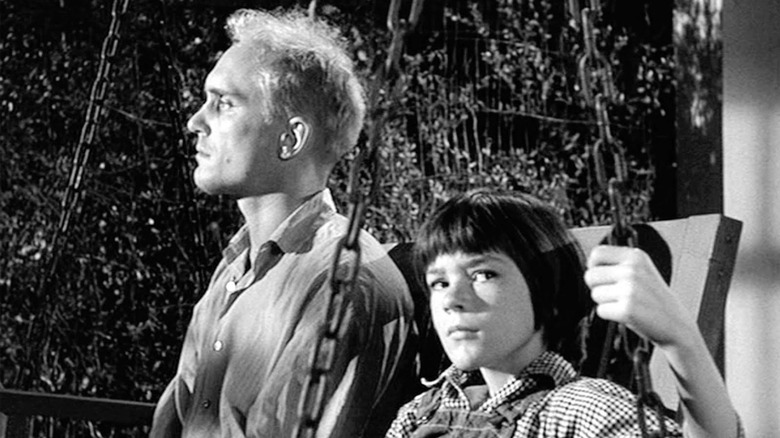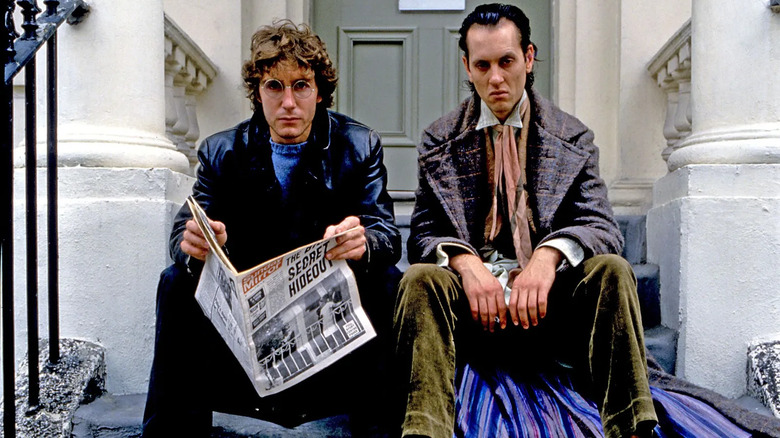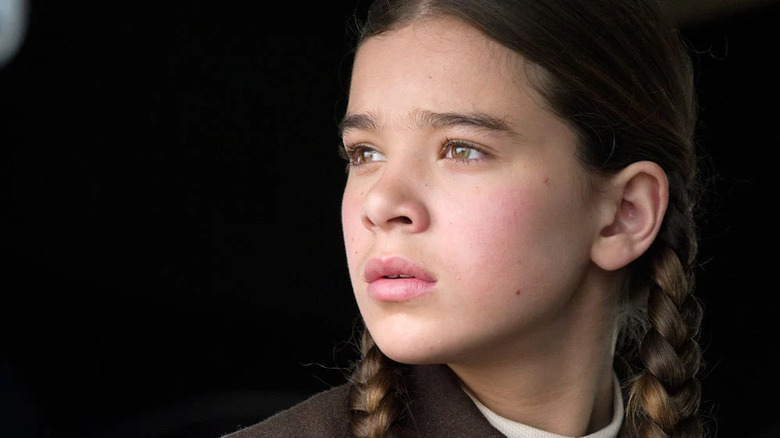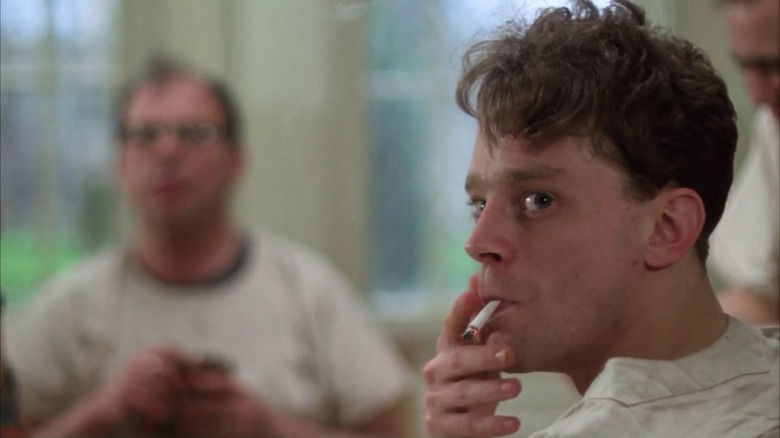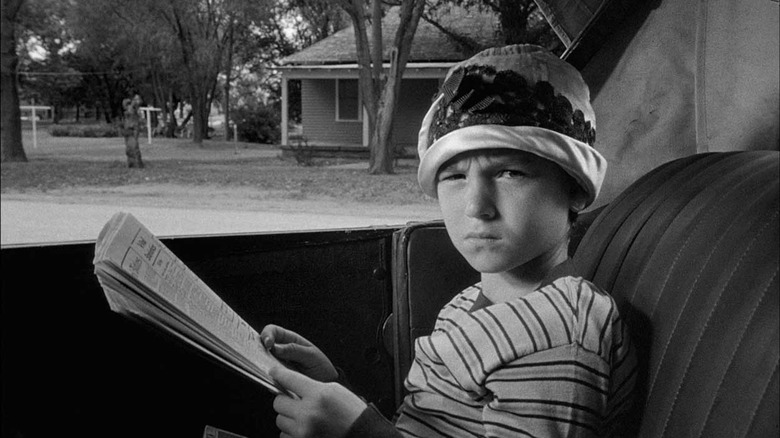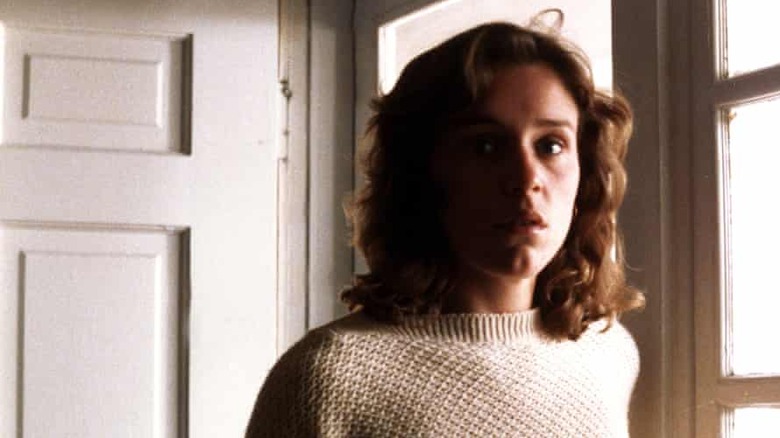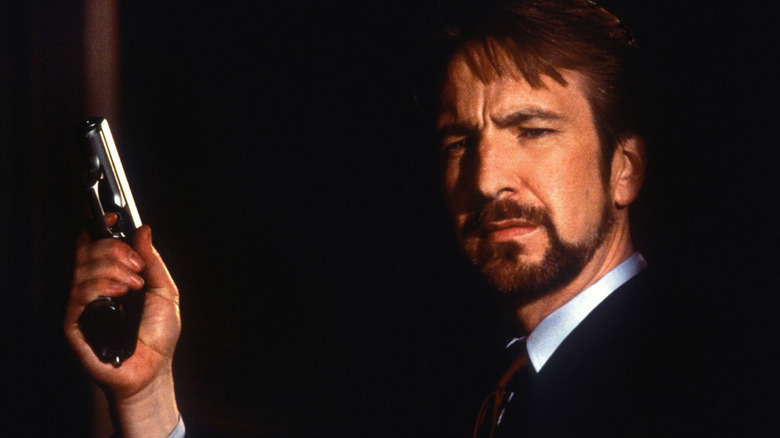The 14 Best Film Acting Debuts Of All Time
As with most creative pursuits, there's a lot to be said for good, old-fashioned experience. It takes time to get comfortable in front of the camera on a film set, even if you worked on stage or television before. So it makes sense that, most of the time, actors tend to start in small, unobtrusive roles and work their way up to leading man or leading lady status. That said, there is something very special about fresh-faced actors walking right onto set — maybe with some theater experience or a few television credits under their belt — and knocking it right out of the park.
We romanticize the concept of the ingenue, the inexperienced but innately talented actor who has so much star power that it's evident from their first moments on screen that they have a bright future ahead of them. You never forget it when you see it: the magic of feeling as though you yourself discovered the next big thing, even if you're only sitting in the audience watching them about to burst onto the scene in a huge way. Here are 14 greatest acting debuts of all time.
14. Dev Patel — Slumdog Millionaire
Is this one cheating? Maybe a little bit. After all, Dev Patel did have a recurring role on "Skins," a British teen show that also gave us the likes of Nicholas Hoult and Daniel Kaluuya, before he made his official feature film debut. But we're talking about the movies, and "Slumdog Millionaire" is both his first film and the role that catapulted him onto a global stage. He plays Jamal, a hapless boy from Mumbai whose life experiences are shown over the course of a fateful episode of "Who Wants to Be a Millionaire?" in which he answers every single question correctly.
Jamal is perhaps not a typical romantic lead: he's incredibly earnest and is less of a person than he is a metaphor for hope and optimism amidst a cruel and unfair world. But the fact that Jamal isn't a character who naturally leaps off the screen, and yet we are still drawn to him, speaks to Dev Patel's inherent magnetism, which became more fully exploited as he matured into a proper leading man.
13. Montgomery Clift — The Search
Montgomery Clift is that actor between Marlon Brando and James Dean who always seems to fall through the cracks. He never gets the credit he deserves! But there was a time, friends, when Montgomery Clift was your go-to devastatingly handsome, emotionally vulnerable young movie star. And that all begins in "The Search," a film made in the immediate aftermath of World War II where Clift plays a young soldier who takes on the responsibility of helping a displaced boy who survived Auschwitz to find his mother.
Clift's incredible screen presence and deep well of emotional resonance is present from day one, as he forges a strong connection with this boy and even plans to try to take him back to the United States with him when he is shipped out. Clift would later go on to act in some mediocre films that didn't quite use his formidable talents to their best advantage, but here we can see a general baseline of what he was capable of as an actor: a bright-eyed starlet with endless charm and a wide open future full of possibilities.
12. Jason Schwartzman — Rushmore
Jason Schwartzman is a member of a veritable Hollywood dynasty, coming from the same clan that brought us Francis Ford Coppola, Sofia Coppola, and Nicolas Cage. So the fact that he would make his acting debut at some point or another was essentially a foregone conclusion. But with his lead performance as the memorable Max Fischer in Wes Anderson's "Rushmore," he launches himself onto the scene with such style that you have to admire him for it.
Max is an overachiever at his prestigious prep school, the founder of dozens of different clubs and associations. But there's just one problem. Actually, two. His poor grades have him on academic probation, one false step away from expulsion, and he finds himself hopelessly in love with a teacher at his school. With Max, Schwartzman builds out a preternaturally mature teenager who is a mass of eccentricity and charm. And when you have a performance this good, who even cares if it's nepotism?
11. Anya Taylor-Joy — The Witch
Anya Taylor-Joy has an otherworldly quality which was evident from her very first film performance. After a handful of minor television roles and a brief career as a teen model, she was cast in "The Witch," a period supernatural horror film directed by Robert Eggers, who was then also embarking on his directorial debut. (The two would both quickly be considered rising stars in their respective field, collaborating for a second time on 2022's "The Northman.")
"The Witch" is the story of a group of English settlers in early America, who have left the security of their settlement in favor of a quiet, untarnished life on the edge of a mysterious forest. Taylor-Joy plays the eldest daughter of the family, who is blamed for the disappearance of her infant brother and suspected of witchcraft — her father lashing out in misdirected rage at his barely concealed lust for her, her mother in denial about her father's wandering eye. She is incandescent as a girl on the verge of womanhood, punished for being insufficiently subdued by the strictures placed on her gender.
10. Malcolm McDowell — If....
Malcolm McDowell has been acting for so long that it's easy to forget that he was ever actually a novice. Still, at some point he had to have had his debut performance, just like anybody else. And while he's perhaps best known for Stanley Kubrick's adaptation of "A Clockwork Orange," his first role captured much of the same youthful, rebellious energy — albeit in a considerably less controversial way.
After acting in small roles on television throughout the '60s, McDowell got his big break when he was 25 years old with the role of Mick in "If....," the story of a group of schoolboys at a prestigious private school and the abuses they face at the hands of their headmaster, their teachers, and the older students who have been put in charge of discipline. It is a reckoning with the traditional power structures in English society, forcing them to acknowledge their reduced relevance in a changing world. And McDowell is captivating: funny, intelligent, always with a simmering defiance just underneath the surface.
9. Lupita Nyong'o — 12 Years a Slave
A pretty safe standard of excellence for a debut performance is getting an Oscar for your very first feature film role; it requires pretty much everyone to acknowledge that you knocked one out of the park immediately. That's what Lupita Nyong'o did in "12 Years a Slave" as Patsey, a young enslaved girl who is brutally treated by her master and his wife. Her performance is unflinching and devastating, sparing the audience none of her anguish.
This accomplished work came after her only other on-screen credit, a role on a Nigerian television show called "Shuga." (Although, it is worth mentioning that before any of this, she got her master's degree in acting from Yale School of Drama, so she wasn't exactly a novice going into "12 Years a Slave.") Still, it's rare that an actor new to screen work is able to elicit such a strong emotional reaction so early on in their career, and Nyong'o would be rewarded for it not just with an Academy Award, but with a slew of roles that would highlight her skill and charisma.
8. Jamie Bell — Billy Elliot
Acting is a hard enough job, especially when you're a kid with limited emotional experience to draw on for the performance. So it boggles the mind that Jamie Bell was not only able to bring to life the vulnerable Billy Elliot, but dance his little legs off in the role as well. His very first performance was in the lead role as Billy, a working-class boy from a mining town in northern England in the early '80s who secretly harbors a passion and genuine talent for dance.
Billy is forced to confront traditional concepts of masculinity, as the idea of men dancing is sneered at by many members of his community. But at the same time there's such an overwhelming sense of joy to his performance, showing that he dances not just because he's good at it, but because he loves it, and it allows him to process the emotions that he would otherwise repress. The energetic sequences as he runs through his neighborhood are the highlight of "Billy Elliot," using the medium of dance to express his anger, pain, grief, and defiance.
7. Robert Duvall — To Kill a Mockingbird
Robert Duvall is barely in "To Kill a Mockingbird." Just a couple of short scenes, and he doesn't ever actually speak. But as Boo Radley, the invisible son of Maycomb, Alabama who represents both the unpleasant history that the town would prefer to keep hidden, as well as Scout's growing maturity in her understanding of the people around her, he makes an incredible impact.
Boo is the town recluse, coming out only at night and scarcely being seen by anyone. Young Scout, alongside her brother Jem, has mentally transformed him into some sort of bogeyman — a monster lurking in their neighborhood — and the reason behind him being locked away in his home for so long has taken on an equally salacious nature in their minds. But with Duvall's limited screen time, he is able to impart the genuine kindness and humanity of Boo Radley in his determination to protect the children, and serve as a reminder to Scout that people are so much more complex and multi-faceted than she'd ever realized.
6. Richard E. Grant — Withnail and I
"Withnail and I" is a triumph of independent filmmaking, a movie that would grow into a cult classic encapsulating a moment in 1960s British culture. It was known primarily for two things: being one of the most intensely quotable films of the entire decade, and launching the careers of a handful of beloved British stars. Among them, it turns out, would be the ebullient Withnail himself, played by Richard E. Grant. It's altogether shocking that a performance this self-assured and iconic could be Grant's feature film debut, but it's the truth.
Before getting the lead role that would put him on the map (Withnail, the flamboyant unemployed actor), Grant was himself a flamboyant unemployed actor, having only appeared in one short film and a single episode of the short-lived television show "Sweet Sixteen." Fun fact: Although his character here is a lover of alcohol (there's even a drinking game where viewers can attempt to keep up with Withnail by drinking whenever he drinks), Richard E. Grant is, ironically, allergic to alcohol. So the fact that he's able to convincingly play one of the greatest drunks in cinematic history is a testament to his acting ability!
5. Hailee Steinfeld — True Grit
There are once-in-a-decade child actor performances: one or two kids out of every generation who just completely steal the films that they're in. Hailee Steinfeld in "True Grit" is one of them. She's acting opposite Jeff Bridges, Matt Damon, and Josh Brolin, three men who have pretty decent reputations (not to mention eleven Academy Award nominations and one win between them), and hers is easily the most compelling performance in the film.
Steinfeld plays a stern, stubborn, hard-hearted teenage girl on a quest to avenge her father's death, whose single-minded determination is such that it actually begins to constitute a character flaw. Steinfeld is able to adopt the cadence of 19th century speech unusually well, and her words have a certain lyricism to them even as they are sharp and occasionally cruel. It's a performance from a child that is well outside the realm of what we can fairly expect from such a young actor, and she was rewarded for it with an Academy Award nomination for Best Supporting Actress, making her one of the youngest performers ever nominated in the category.
4. Brad Dourif — One Flew Over the Cuckoo's Nest
A lot of modern viewers would most likely associate Brad Dourif with some of his shadier roles, such as Chucky in the "Child's Play" franchise, or Grima Wormtongue in "Lord of the Rings." So it might come as a shock that his very first film role was as the delicate, intensely vulnerable Billy Bibbit in "One Flew Over the Cuckoo's Nest." Dourif is quietly devastating as the youngest patient in the film's psychiatric ward, a shy, stuttering man whom R.P. McMurphy (Jack Nicholson) takes under his wing, seeing as we do that he's far more stable and, well, normal than any of the others.
The tragedy of Billy is how thoroughly he is controlled by both his mother and, by extension, Nurse Ratched, who is able to take him from beaming and full of life to utterly suicidal with just a few simple words: "You know, Billy, what worries me is how your mother is going to take this." You watch Brad Dourif's face, how he completely crumbles at this, and it's shocking to learn that this was his first ever on-screen performance.
3. Tatum O'Neal — Paper Moon
There's good child acting, and then there's Tatum O'Neal, out there in a class of her own in "Paper Moon." She stars alongside her father, Ryan O'Neal, as a Depression-era orphan who teams up with a con man to swindle the bereaved with a truly heinous Bible scam, only for bonds of affection to develop between the two of them.
Part of what was so appealing about Tatum's performance is that she never felt like the sort of overly rehearsed cutesy child actress that we see in so many films. She has a really natural line delivery and great chemistry with her father (obviously aided by their already existing relationship), and her entire vibe is just not what you'd expect. She's an adorable little girl, but she's also kind of rough around the edges. She can be frosty and abrasive and domineering, with hints of vulnerability that drive the audience's emotional connection with her.
For her performance in "Paper Moon," O'Neal won an Academy Award for best supporting actress at the age of 10 — the youngest competitive Oscar win in history, and an achievement which unfortunately clouded the already complicated relationship with her father, who wasn't similarly honored for his work in "Paper Moon."
2. Frances McDormand — Blood Simple
Frances McDormand and the Coen Brothers: they go together like peanut butter and jelly. Although only one of her three acting Academy Awards came from a collaboration with the famed directors and screenwriters Ethan and Joel Coen, they have worked together often over the years and always with great success. But their first film together, "Blood Simple," is arguably one of their best.
McDormand stars as Abby, a woman in an unhappy marriage who unwittingly gets caught up in a murder plot when her husband hires an investigator to follow her to one of her romantic trysts. It's a neo-noir which, like many of the Coen Brothers' later works, would seamlessly blend violence and dark humor in equal measure. McDormand's screen presence is undeniable, and it's easy to see why this performance would herald her introduction to Hollywood, leading to a career as one of the industry's most reliably eccentric actresses.
1. Alan Rickman — Die Hard
It feels like there was never a time when Alan Rickman wasn't acting in movies, but he actually only transitioned from theater and television in the late 1980s. To be more specific, in "Die Hard" as Hans Gruber. You're probably thinking: "How is it possible that Hans Gruber, one of the most famous villains of all time, was Alan Rickman's first ever film role?" Well, it was. And it was the first in what would become a long tradition of Rickman taking on darkly sardonic roles.
Like many of Rickman's villain characters, one of the most compelling aspects of Hans is how charismatic he is. Morally bankrupt and devoid of sentiment, perhaps, but incredibly captivating in a role that could, in the hands of a lesser actor, be paper thin. We've all seen bog standard action thrillers from the Reagan years, where cardboard cutouts of villains are propped up for macho American heroes to fight against in a jingoistic frenzy. This isn't that: Alan Rickman makes sure of it.
